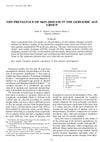11 citations,
January 2013 in “International Journal of Trichology” Emotional factors are crucial in treating and preventing scalp neurodermatitis and hair loss.
 November 2018 in “Skin appendage disorders”
November 2018 in “Skin appendage disorders” The document concludes that a woman has both Frontal Fibrosing Alopecia and Lichen Simplex Chronicus, a previously unreported combination of conditions.
4 citations,
January 2020 in “Indian dermatology online journal” Lichen simplex chronicus on the scalp can be diagnosed by specific hair and skin signs and treated with corticosteroids and therapy.
 April 2014 in “Jurnal Biomedik : JBM”
April 2014 in “Jurnal Biomedik : JBM” An 8-year-old girl had nail and hair issues that improved without specific treatment, but fungal nail infection was hard to cure.
 January 2009 in “Springer eBooks”
January 2009 in “Springer eBooks” The document concludes that treating skin conditions should include psychological care and a multidisciplinary approach is essential for effective management.
 July 1975 in “Archives of Dermatology”
July 1975 in “Archives of Dermatology” The document suggests a possible connection between rapid weight loss and hair loss, and reports a case of skin condition improvement after stopping acne medication.
 1 citations,
January 2006 in “Elsevier eBooks”
1 citations,
January 2006 in “Elsevier eBooks” The conclusion is that different types of hair loss in dogs and cats can be cosmetic or serious, and affected animals should not be bred.
 1 citations,
July 2013 in “JAMA Dermatology”
1 citations,
July 2013 in “JAMA Dermatology” Dermatologists should address erectile dysfunction in patients with skin conditions to improve their quality of life.
 September 2016 in “Elsevier eBooks”
September 2016 in “Elsevier eBooks” Different types of hair loss in dogs and cats have various causes and treatments, with outcomes ranging from good to uncertain.
 January 2011 in “Elsevier eBooks”
January 2011 in “Elsevier eBooks” Alopecia in animals can be hereditary, congenital, or acquired, with treatments and outcomes varying widely.
 100 citations,
July 2018 in “Journal of The American Academy of Dermatology”
100 citations,
July 2018 in “Journal of The American Academy of Dermatology” People with alopecia areata often have other health issues like skin diseases, metabolic syndrome, stomach infections, lupus, anemia, thyroid problems, mental health issues, vitamin D deficiency, and hearing and eye problems.
 85 citations,
June 2015 in “Scientific Reports”
85 citations,
June 2015 in “Scientific Reports” The study found that diseases can be grouped by symptoms and that the accuracy of predicting disease-related genes varies with the data source.
 73 citations,
July 2016 in “Cosmetics”
73 citations,
July 2016 in “Cosmetics” Mushrooms have beneficial properties for skin and hair care products and have great potential for future cosmetic use.
 71 citations,
January 2015 in “The Scientific World Journal”
71 citations,
January 2015 in “The Scientific World Journal” Insulin resistance may contribute to various skin diseases and treating it could improve skin health and prevent more serious conditions.
 41 citations,
March 2010 in “Psychology Research and Behavior Management”
41 citations,
March 2010 in “Psychology Research and Behavior Management” Using psychological treatments can help manage skin conditions along with regular medical care.
 39 citations,
March 2003 in “The Veterinary clinics of North America. Small animal practice/Veterinary clinics of North America. Small animal practice”
39 citations,
March 2003 in “The Veterinary clinics of North America. Small animal practice/Veterinary clinics of North America. Small animal practice” Behavioral dermatology treats skin problems by considering both emotional and physical factors.
 36 citations,
January 2012 in “International Journal of Trichology”
36 citations,
January 2012 in “International Journal of Trichology” Losing eyelashes or eyebrows can be a sign of many different health problems and needs a careful approach to treat effectively.
 35 citations,
January 2009 in “Indian Journal of Dermatology, Venereology and Leprology”
35 citations,
January 2009 in “Indian Journal of Dermatology, Venereology and Leprology” Older adults commonly experience wrinkles, itchy skin, psoriasis, fungal infections, skin growths, grey hair, hair loss, and nail ridging, but no skin cancer was found in this group.
 33 citations,
August 2018 in “Facial Plastic Surgery Clinics of North America”
33 citations,
August 2018 in “Facial Plastic Surgery Clinics of North America” The document explains hair biology, the causes of hair loss, and reviews various hair loss treatments.
 33 citations,
November 2006 in “Survey of Ophthalmology”
33 citations,
November 2006 in “Survey of Ophthalmology” Madarosis is the loss of eyelashes and eyebrows due to various health issues and requires thorough examination to diagnose and treat the underlying cause.
 31 citations,
October 2013 in “Psychosomatics”
31 citations,
October 2013 in “Psychosomatics” Psychotropic medications can cause skin reactions, including severe conditions like SJS and TEN, and it's important for psychiatrists to recognize and manage these side effects.
 28 citations,
December 2019 in “Skin appendage disorders”
28 citations,
December 2019 in “Skin appendage disorders” Some medications might reverse gray hair, especially those that reduce inflammation or stimulate pigment production, and vitamin B might help.
 26 citations,
August 2020 in “Dermatology Research and Practice”
26 citations,
August 2020 in “Dermatology Research and Practice” COVID-19 can cause various skin problems, including reactions to protective gear and medication, with different rates reported worldwide, and more research is needed to fully understand these skin issues.
 25 citations,
July 2021 in “Journal of Medical Virology”
25 citations,
July 2021 in “Journal of Medical Virology” COVID-19 can cause various skin issues, including rashes and hair loss, which usually heal on their own and don't always indicate severe illness.
 23 citations,
August 1987 in “Australasian Journal of Dermatology”
23 citations,
August 1987 in “Australasian Journal of Dermatology” Older adults in Ottawa commonly have skin conditions like sun damage, dry skin, and hair loss.
 22 citations,
November 2014 in “Psychiatric Clinics of North America”
22 citations,
November 2014 in “Psychiatric Clinics of North America” Stress can worsen skin conditions and affect mental health, so doctors should include stress management in skin treatment.
 16 citations,
August 1967 in “JAMA”
16 citations,
August 1967 in “JAMA” Oral contraceptives may cause hair loss in women.
 15 citations,
June 2004 in “International Journal of Dermatology”
15 citations,
June 2004 in “International Journal of Dermatology” Most kidney transplant patients in the study had skin problems, often related to infections, medication side effects, or skin cancer risks.
 7 citations,
July 2011 in “Survey of Ophthalmology”
7 citations,
July 2011 in “Survey of Ophthalmology” The document concludes that periocular hair disorders have various causes and treatments, and proper evaluation by specialists is important for management and prognosis.
 5 citations,
January 2017 in “Clinics in Dermatology”
5 citations,
January 2017 in “Clinics in Dermatology” Skin symptoms without a medical cause often reflect psychological stress and are influenced by culture, requiring a team approach for treatment.



























